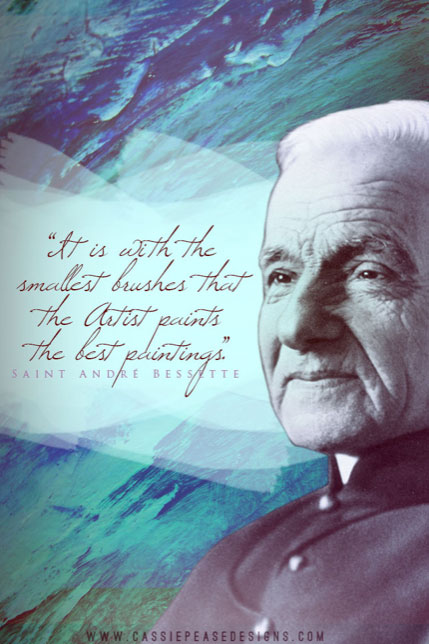Feast Day: January 6th

January 6th is the liturgical date of the feast of the Epiphany, concluding the highest, central part of our Christmas season, our this feast celebrating Our Lord’s revelation to the gentiles can be moved to one of the Sundays between January 2nd-8th if (as in our country) it is not a Holy Day of Obligation. So, we will celebrate the Epiphany this year on Sunday, January 3rd… Which means I can focus this article on St. Andre Bessette because we will be celebrating his feast day this Wednesday, on January 6th. I get the feeling that Andre doesn’t mind often being overshadowed by Christ … I suppose most saints don’t, that’s probably why they are saints!
Andre, born Alfred, had been born 40 miles southeast of Montreal, Quebec, grew up in poverty, spent several years in Connecticut trying to work in the textile mills, and then, at the age of 25 walked up to the door of the Congregation of the Holy Cross. His health was frail, he had struggled to hold down a job, he was trying to join an order of teachers but couldn’t read and write. His resume was ridiculously short, but he had a note from his parish priest to the superior that said all that mattered: “I am sending you a saint.”
What was it that made him a saint? For the next 40 years, assigned as the porter – the brother at the door – of the Congregation’s Notre Dame boy’s school, he showed us all that it came down to trust. When he didn’t have the strength or the mind for religious life, he went anyway, trusting that God would open the way. When he found himself assigned to menial jobs for practically his entire life, he trusted that the Lord would do His work all the same through that. When he was called to visit the sick, amid a pandemic no less, he simply prayed with those afflicted, anointed them with oil from the chapel, and told them to pray to St. Joseph2. And, with copious trust, they were all cured, and they began to flock to him as a healer and miracle-worker. In the same way that Our Lord had attracted crowds 1900 years before, reams of people came with their sicknesses and broken hearts to Br. Andre, and he simply pointed them to God, and to St. Joseph.

And that is a final lesson of trust that he teaches us: in 1904, a few years after taking his vows and being assigned as porter, he asked the bishop if he could build a shrine to his favorite saint on the hill overlooking the college. The bishop gave him permission, as long as he did not have to borrow any money. With a whole lot of trust, Br. Andre started colleting nickels and dimes that he earned by giving haircuts to the boys, and gradually a windbreak, then a little shed, and then a small chapel arose upon the hill. It would be 20 years before construction began on what is now a Basilica, called St. Joseph’s Oratory. 13 years later, the simple doorman died, and one million people came to his funeral.
Trust, it is the mark of every saint. In St. Andre it was trust in the powerful intercession of St. Joseph. As we plunge into this year of St. Joseph, in what area of your life can you practice trust? Caution: it might mean trusting for decades, but it might also be the source of millions of miracles in your life and in the lives of those you love.
– Fr. Dominic Rankin enters and exits doors approximately 100 times each day. If every one of those were turned into an act of trust in God, he would be as saintly as St. Andre Bessette, St. John Masias, Bl. Josep Tarrats Comaposada, or Bl. Solanas Casey, all of whom were doorkeepers at their monasteries, and became a saint because of it.